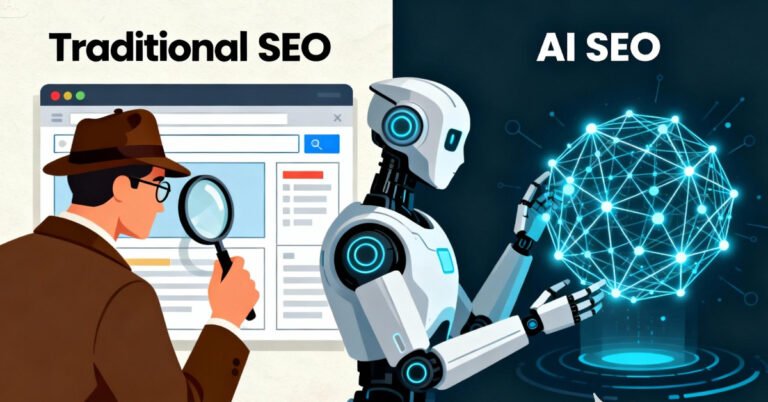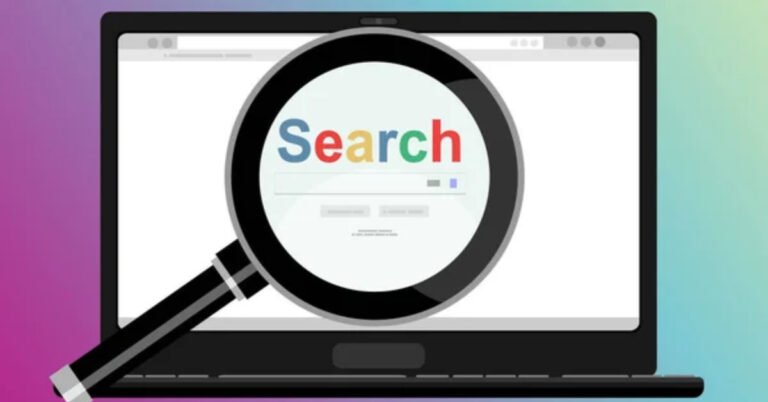The digital world is changing fast. Search is no longer just typing words into Google. With Artificial Intelligence (AI), search engines have become smarter. They now use natural language, voice, and even context to deliver instant answers. If you want your business to stay visible, you need guidance from the Best SEO Expert. An SEO expert makes sure your site is ready for AI-driven search, helping you rank higher and connect with the right audience.
In this guide, you will discover how SEO experts prepare your website for AI search. We will cover AEO (Answer Engine Optimization), GEO (Generative Engine Optimization), LLM (Large Language Models), Semantic SEO, and NLP (Natural Language Processing). These are the keys to standing out in AI-powered search results.
What Is AI Search?
AI search is different from traditional search. Instead of showing a list of blue links, AI tools like Google’s Search Generative Experience (SGE), Bing AI, and ChatGPT can give direct answers. They can summarize information, compare options, and provide insights in seconds.
This shift means websites must be optimized for context, meaning, and intent—not just keywords. AI wants clear, structured, and valuable information that can be turned into accurate responses.
Why Businesses Must Adapt to AI Search
Your customers are already using AI-powered tools. Many people now search with voice, ask full questions, or use AI chatbots. If your site is not optimized for these tools, your competitors will get the advantage.
Here’s why adapting is critical:
- AI favors authority and trust – It promotes content from reliable sources.
- Search is conversational – Users now search like they are talking to a friend.
- AI highlights only the best – Unlike traditional search that shows many results, AI may show only a few.
To stay ahead, you need SEO strategies designed for AI search.
The Role of an SEO Expert in AI Search
An SEO expert does more than add keywords. Their main goal in AI search is to build authority, clarity, and meaning across your content. Here’s how they help:
- Understanding AI Algorithms – AI uses LLMs and NLP to process language. Experts align your content with how AI interprets data.
- Optimizing for User Intent – They create content that answers real questions, which AI engines prefer.
- Structuring Data – Experts apply schema markup and structured content so AI can easily detect key information.
- Building Authority and Trust (EEAT) – They strengthen your site’s expertise, authority, and trustworthiness.
- Staying Ahead of Trends – SEO pros track AI search changes and keep your site competitive.
Optimizing Content for AI-Driven Search Results
AI-driven search engines are changing the way content ranks online. To succeed, your website needs clear, helpful, and relevant content. Here’s how to optimize for AI search results:

1. Use Clear and Simple Language
AI systems prefer content that is easy to read. Use short sentences and common words. Avoid long or complex sentences. This helps both humans and AI understand your message quickly.
2. Focus on User Intent
Understand why someone is searching. Are they looking for information, a product, or advice? Match your content to what users want. AI prioritizes content that fulfills search intent.
3. Include Relevant Keywords Naturally
Keywords are still important. Place them in titles, headings, and throughout your text—but use them naturally. Avoid keyword stuffing, as AI can detect unnatural patterns.
4. Structure Your Content Well
Use headings, subheadings, and bullet points. Clear structure helps AI understand your content’s hierarchy. It also makes it easier for readers to scan and find information.
5. Provide Value and Answers
AI favors content that answers questions thoroughly. Include examples, clear explanations, and actionable tips. Focus on quality over quantity to satisfy both readers and AI systems.
6. Use Semantic SEO
Include related terms and concepts around your main topic. AI looks for context, not just exact keyword matches. This improves relevance and search performance.
7. Keep Content Fresh and Updated
Regularly update your content to reflect new information. AI rewards websites that provide accurate and current information.
8. Optimize for Voice Search and Conversational Queries
Many AI searches are spoken. Write in a natural, conversational tone. This improves your chances of being discovered in voice-based searches.
9. Improve Readability and Engagement
Use short paragraphs, bullet points, and clear formatting. Engaged readers send positive signals to AI, boosting your content’s ranking potential.
Technical SEO Adaptation for AI Search
AI-driven search engines now focus a lot on how your website is set up. To rank well, you need to optimize not just for human visitors but also for AI algorithms. A skilled SEO expert ensures your site meets these technical standards.
AI-Friendly Site Structure
An SEO expert organizes your website so AI algorithms can crawl and understand it easily. This includes clear menus, logical internal links, and simple navigation. When AI bots and users can find information quickly, your site ranks higher and gives visitors a better experience.
Page Experience Signals
AI search engines pay attention to user experience when ranking pages. Key factors include page speed, mobile-friendliness, and HTTPS security. A professional SEO adjusts these elements to meet AI requirements while keeping your visitors happy.
Fast Loading and Mobile Design
Pages that load quickly keep visitors engaged. Mobile-friendly layouts make your website work well on phones and tablets. Together, these improvements signal quality to AI search engines and improve your chances of ranking higher.
Canonical and Crawlable URLs
Proper URL setup is crucial for AI search. Canonical URLs prevent duplicate content issues, while crawlable URLs help AI bots index your site easily. SEO experts design URLs to be simple, readable, and algorithm-friendly.
By focusing on these technical SEO areas, your website becomes easier for AI search engines to understand. This improves your chances of ranking higher and reaching the right audience.
AEO: Answer Engine Optimization
Answer Engine Optimization (AEO) prepares your site for AI tools that deliver direct answers.
How it works: AI pulls answers from trusted sources and shows them as quick summaries.
How SEO experts optimize for AEO:
- Create FAQ sections.
- Use clear, simple language.
- Write content that answers who, what, when, where, why, and how.
With AEO, your brand can appear when users ask AI tools specific questions.
GEO: Generative Engine Optimization
Generative Engine Optimization (GEO) focuses on how AI builds summaries from multiple websites. Tools like Google SGE rely on this method.
How SEO experts help:
- Write informative content that AI can pull into summaries.
- Add authority and depth so your brand is cited.
- Ensure content is structured for machine reading.
With GEO, your brand has a better chance of being mentioned in AI-generated overviews.
LLM: Large Language Models in Search
Large Language Models (LLMs) like GPT and Bard power AI search. They process text at scale. If your content is confusing or poorly structured, these models may skip it.
An SEO expert ensures your content is:
- Readable – Short sentences, simple words.
- Contextual – Covers topics in detail with related ideas.
- Relevant – Matches user search intent.
This alignment makes your content easier for LLMs to pick up.
Semantic SEO for AI Search
Semantic SEO is about meaning, not just keywords. AI looks at context and word relationships.
For example: If someone searches “best fireplaces for winter,” AI doesn’t only look for that phrase. It also looks for terms like “wood-burning fireplaces,” “indoor heating,” and “energy-efficient designs.”
SEO experts apply Semantic SEO by:
- Using topic clusters.
- Linking related pages.
- Covering subjects in depth.
This makes your content more relevant and AI-friendly.
NLP: Natural Language Processing
NLP helps AI understand human language. Search engines use NLP to break down queries and match them with answers.
SEO experts optimize for NLP by:
- Writing in a conversational tone.
- Using question-based headings.
- Adding structured answers.
This makes your site more likely to appear when people ask questions in AI-powered search.
Practical SEO Expert Strategies for AI Search
Here are real strategies SEO experts use to prepare your site:
- Voice Search Optimization – Use natural spoken phrases.
- Schema Markup – Helps AI extract answers.
- Content Simplification – Short, clear, easy-to-read content works best.
- Topic Authority Building – Long-form, detailed guides build trust.
- Continuous Monitoring – SEO experts adjust as AI search evolves.
The Future of SEO in an AI World
SEO is not going away with AI. In fact, it is becoming more important. AI tools need reliable content to generate answers—and that content comes from websites.
Without SEO, your site will stay invisible to both users and AI.
In the future, SEO experts will continue to adapt using:
- AEO to target direct answers.
- GEO to win spots in AI summaries.
- Semantic SEO for contextual depth.
- NLP for conversational queries.
Conclusion
AI search is the future of digital discovery. But it is not something to fear. With the right SEO strategies, your business can stand out, attract more users, and build lasting authority.
An SEO expert ensures your website is ready by focusing on AEO, GEO, LLM, Semantic SEO, and NLP. With their guidance, your site can rank higher, earn trust, and achieve long-term growth in the AI-driven world.
If you want your business to succeed in AI search results, the first step is working with the best seo expert.
Frequently Asked Questions.
What does an SEO expert do for AI search rankings?
An SEO expert optimizes content to align with AI-driven search algorithms, focusing on relevance, context, and user intent.
How is AI SEO different from traditional SEO?
AI SEO emphasizes understanding user intent and context rather than just keywords, optimizing for AI systems like ChatGPT-powered search engines.
Can an SEO expert help my content appear in AI-generated snippets?
Yes, by structuring content with clear headings, FAQs, and semantic relevance, an SEO expert can increase the chance of appearing in AI-generated snippets.
Why is structured data important for AI SEO?
Structured data helps AI systems understand your content better, making it easier to feature your website in AI search results and rich snippets.
How can I measure the effectiveness of AI SEO?
Effectiveness can be measured through improved visibility in AI search, higher traffic from AI-driven queries, and increased user engagement metrics.





